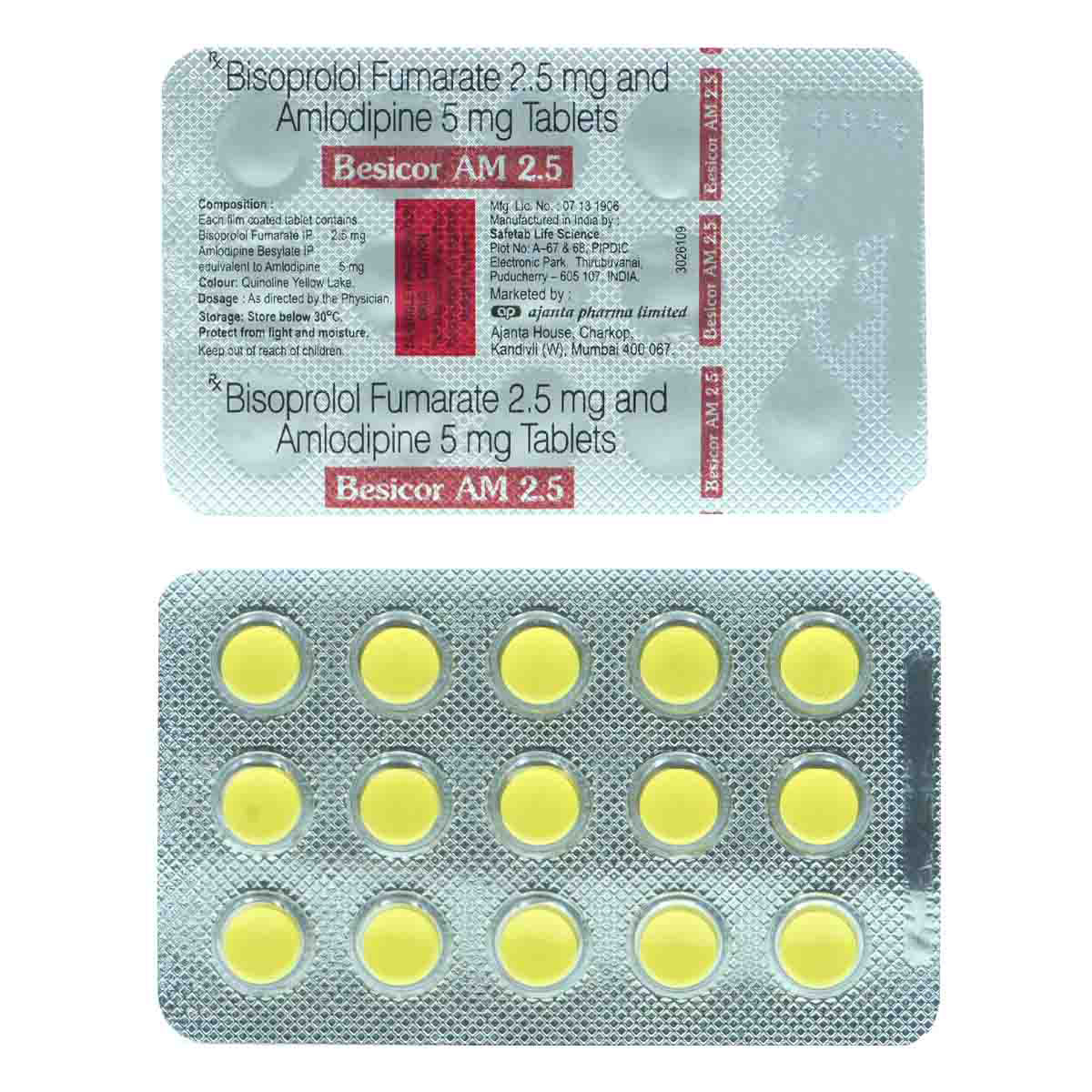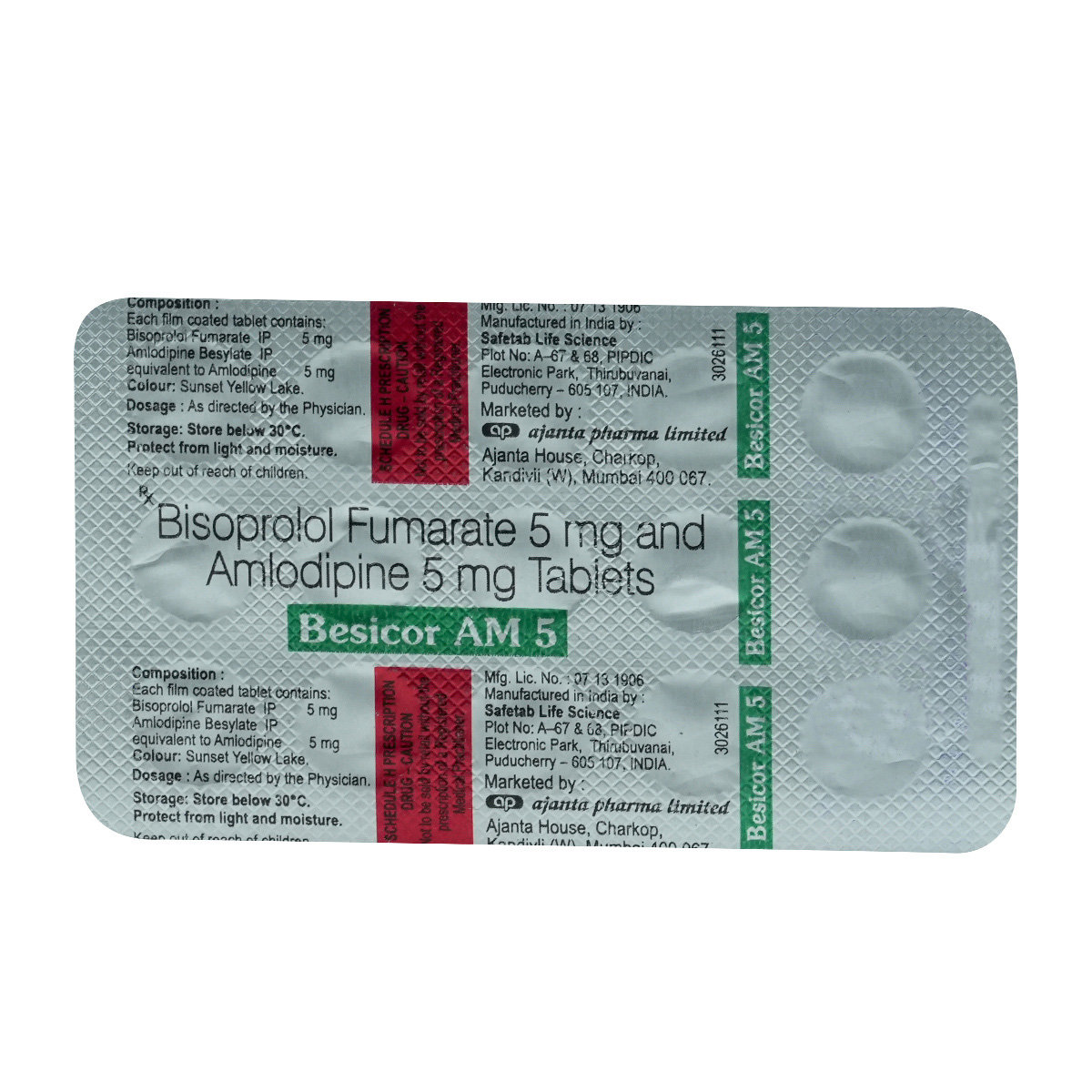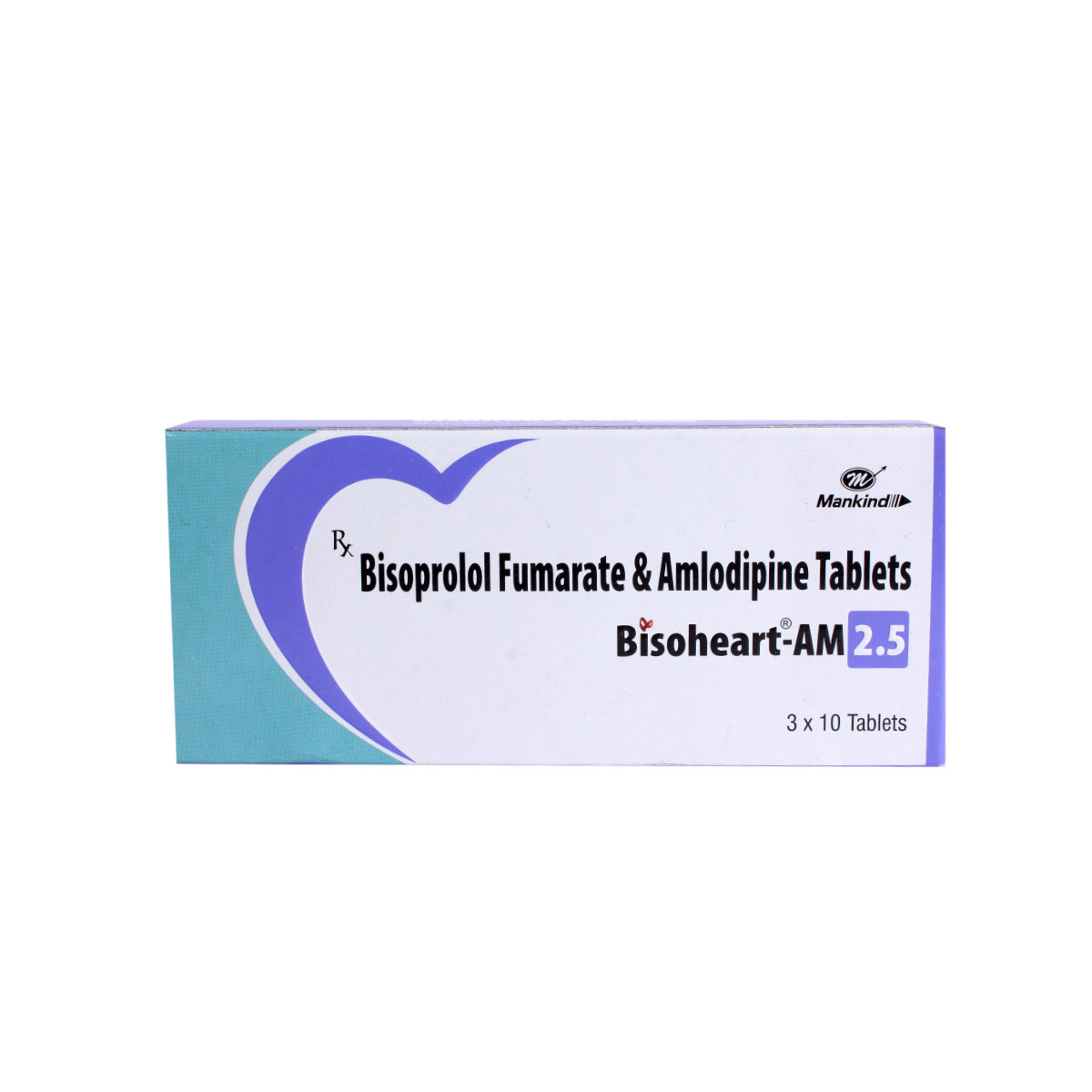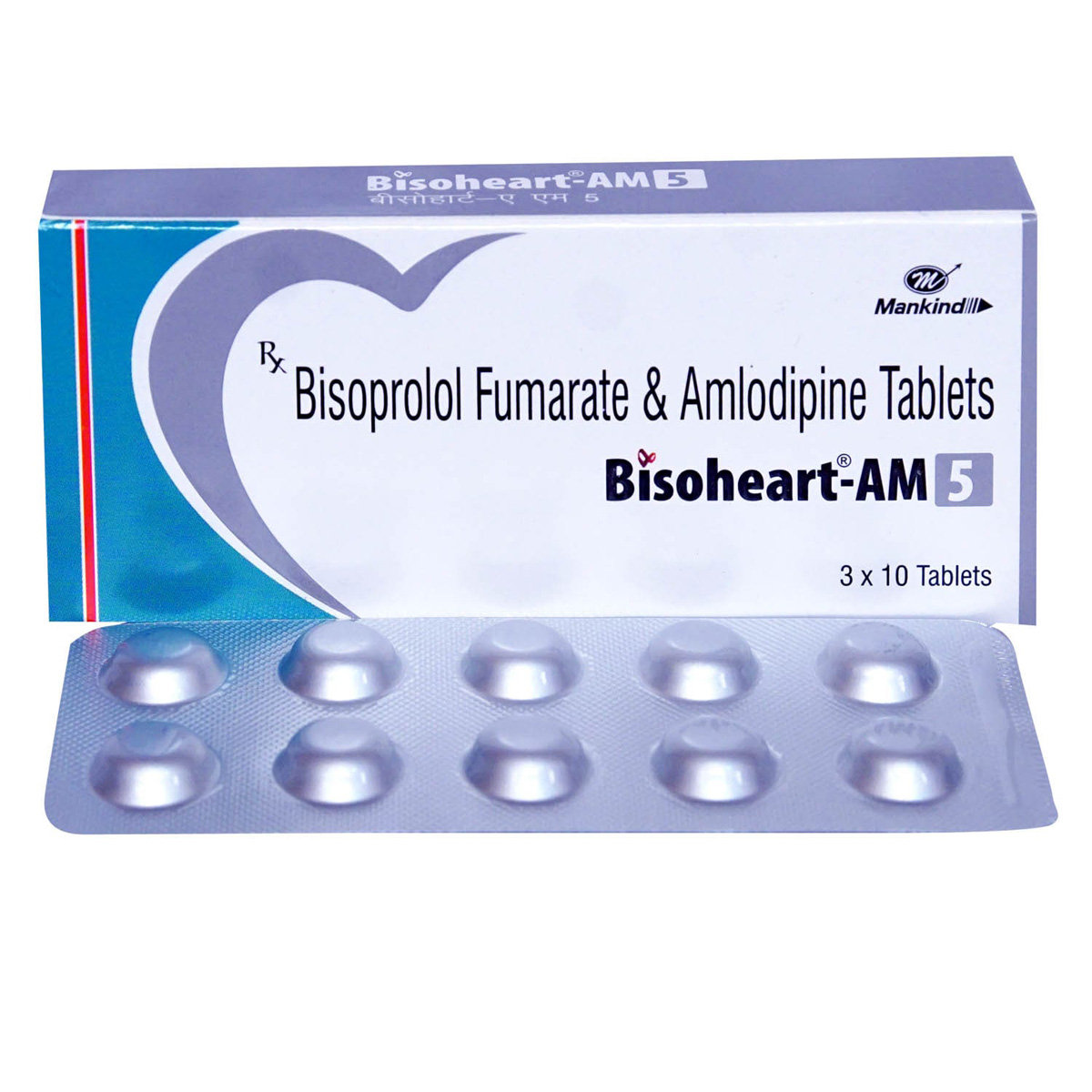Bisoprolol+s Amlodipine
About Bisoprolol+s Amlodipine
Bisoprolol+s Amlodipine belongs to the class of medicines called antihypertensives used to treat high blood pressure. Hypertension or high blood pressure is a chronic condition in which the force exerted by the blood against the artery wall is high. As a result, it leads to heart disease, irregular heartbeat, and other complications.
Bisoprolol+s Amlodipine contains S Amlodipine (calcium channel blocker) and Bisoprolol (beta blocker). S Amlodipine acts by relaxing the blood vessels. This reduces the workload on the heart and makes the heart more efficient at pumping blood throughout the body. Bisoprolol helps relax the blood vessels by blocking the action of certain natural substances in your body. This lowers your blood pressure and reduces your risk of having a stroke, a heart attack, other heart problems, or kidney problems in the future. This medicine needs to be taken regularly as prescribed.
Bisoprolol+s Amlodipine can be taken with or without food as prescribed by your doctor. You may experience common side effects like headache, feeling exhausted and swollen ankles that usually resolve after some time. Prolonged intake of Bisoprolol+s Amlodipine may lead to a lowering of blood pressure. Close monitoring of blood pressure is advised if you have ever had a stroke or heart attack or currently taking other blood pressure-lowering pills. Do not stop taking this medicine without first consulting your doctor.
It is advisable to drink plenty of fluids while taking this medicine to overcome muscle weakness, dry mouth, and extreme thirst. Do not take grapefruit or grapefruit juices while on treatment with Bisoprolol+s Amlodipine as it can increase the concentration of this medicine and worsen the side effects. Please inform your doctor if you have had an allergic reaction to Bisoprolol+s Amlodipine, are pregnant or planning pregnancy, are breastfeeding, have liver disease, kidney disease, heart failure, diabetes, heart valve problem or heart attack.
Uses of Bisoprolol+s Amlodipine
Medicinal Benefits
Bisoprolol+s Amlodipine is a combination of S Amlodipine and Bisoprolol, which together helps in lowering raised blood pressure effectively. S Amlodipine is a calcium channel blocker that acts by relaxing the blood vessels. This reduces the workload on the heart and makes the heart more efficient at pumping blood throughout the body. Bisoprolol (beta blocker) helps in relaxing our blood vessels by blocking the action of certain natural substances in your body. This lowers your blood pressure and helps in reducing your risk of having a stroke, a heart attack, other heart problems, or kidney problems in the future. This medicine needs to be taken regularly for better results.
Directions for Use
Storage
Side Effects of Bisoprolol+s Amlodipine
- Bradycardia (slow heart rate)
- Increased blood potassium level
- Cold extremities
- Nausea
- Fatigue
- Stomach upset
Drug Warnings
Don't stop taking Bisoprolol+s Amlodipine without talking to your doctor first. Stopping Bisoprolol+s Amlodipine abruptly may cause changes in your heart rhythm and blood pressure, cause chest pain, or a heart attack. Your doctor will lower your dose gradually over a period of time to help prevent these symptoms. You should not use Bisoprolol+s Amlodipine if you have a very slow heartbeat, asthma, serious heart condition (sick sinus syndrome), or any heart blockage. It should not be given to children less than 12 years of age. Before taking Bisoprolol+s Amlodipine you should tell your doctor if you have any muscle disorder (myasthenia gravis, rhabdomyolysis), breathing problems (COPD, bronchitis, emphysema), low blood sugar level (hypoglycaemia), low blood pressure (hypotension), depression, previous heart failure, liver/kidney disease, thyroid hormone disorder, adrenal gland cancer, or problems with circulation (Raynaud’s syndrome).
Drug Interactions
Drug-Drug Interactions: Bisoprolol+s Amlodipine may interact with other beta-blockers (acebutolol, atenolol, bisoprolol, carteolol, esmolol, metoprolol, nadolol, nebivolol or sotalol), causing a dangerous drop in the heart rate. It also reacts with other anti-hypertensive drugs (aliskiren, amiloride, enalapril, captopril, quinapril, and diltiazem). Besides this, Bisoprolol+s Amlodipine should not be used with other asthma medications (theophylline, aminophylline), potassium-rich supplements, or other pain killers (ibuprofen). If you are using these medicines, tell your doctor before taking Bisoprolol+s Amlodipine.
Drug-Food Interactions: Bisoprolol+s Amlodipine is known to interact with grapefruit and protein-enriched foods. Using Bisoprolol+s Amlodipine together with ayurvedic, homoeopathy, Unani, herbal supplements, or any other OTC items may decrease the effects of Bisoprolol+s Amlodipine. Hence, it is better to maintain at least 2 hours gap between the administration of Bisoprolol+s Amlodipine and these products.
Drug-Disease Interactions: Bisoprolol+s Amlodipine should not be given to people with diabetes, thyroid disease, asthma, cardiogenic shock (when the heart fails to pump required blood to the body), heart valve problem (stenosis), low blood pressure (hypotension), coronary heart disease, liver disease or heart failure.
Drug-Drug Interactions Checker List:
Safety Advice

Alcohol
unsafeAvoid consumption of alcohol with Bisoprolol+s Amlodipine as it may increase the risk of low blood pressure and cause adverse effects such as dizziness, fainting, light-headedness, or headache.

Pregnancy
cautionIf you are pregnant, inform your doctor before taking Bisoprolol+s Amlodipine. Your doctor may prescribe this medicine if the benefits outweigh the risks.

Breast Feeding
cautionInform your doctor before taking Bisoprolol+s Amlodipine if you are breastfeeding. Your doctor may prescribe this medicine if the benefits outweigh the risks.

Driving
unsafeBisoprolol+s Amlodipine may cause dizziness or tiredness in some people. Therefore, avoid driving if you feel dizzy or tired after taking Bisoprolol+s Amlodipine.

Liver
cautionBisoprolol+s Amlodipine should be used with caution if you have a history of liver problems. Your doctor may adjust the dose if necessary based on your condition. Avoid taking Bisoprolol+s Amlodipine if you have severe liver disease.

Kidney
cautionBisoprolol+s Amlodipine should be used with caution if you have a history of kidney problems. Your doctor may adjust the dose if necessary based on your condition. Avoid taking Bisoprolol+s Amlodipine if you have severe kidney disease.

Children
unsafeBisoprolol+s Amlodipine is not recommended for children below 18 years as safety and effectiveness are not established.
Habit Forming
Diet & Lifestyle Advise
- Keep your weight under control with BMI (Body Mass Index) 19.5-24.9.
- Do regular physical activity or exercise for at least 150 minutes per week, or about 30 minutes most days of the week. Doing this can help lower your raised blood pressure by about 5 mm of Hg.
- Opt for a diet rich in whole grains, fruits, veggies, and low-fat dairy products.
- If you are taking alcohol, then only one serving for women and two servings for men is advisable.
- Quitting smoking is the best strategy to lower the risk of heart disease.
- Avoid chronic stress, as it can raise your blood pressure. Try to enjoy and spent time with your loved ones to cope with stress and practice mindfulness techniques.
- Monitor your blood pressure daily, and if there is too much fluctuation, immediately contact your doctor.
- Include heart-healthy omega-3 fatty acids containing food and drinks in your daily diet. You can also use low-fat cooking oil like olive oil, soybean oil, canola oil, and coconut oil can help lower your elevated blood pressure.
Special Advise
Limit sodium chloride (table salt) intake in your daily diet to 2300 mg per day or less than 1500 mg is ideal for most adults.
Patients Concern
Disease/Condition Glossary
Hypertension: It is a chronic condition when blood pressure is too high. This condition can lead to hardened arteries (blood vessels), decreasing the blood and oxygen flow to the heart. Blood pressure is the measurement of the force that our heart uses to pump blood to all parts of the body. Raised blood pressure can cause chest pain (angina) and heart attack (when the blood supply to the heart is blocked). Additionally, high blood pressure also causes brain damage (stroke) and kidney failure. High blood pressure can be diagnosed with the help of a blood pressure monitor or sphygmomanometer. Systolic pressure is the pressure when the heart pumps blood out. On the other hand, diastolic pressure is the pressure when your heart is at the resting stage between heartbeats. If your blood pressure is 140/90 mm of Hg, the systolic pressure is 140 mm of Hg, and diastolic pressure is 90 mm of Hg. Ideal blood pressure should be between 90/60 mm of Hg and 120/80 mm of Hg.
FAQs
Bisoprolol+s Amlodipine contains S Amlodipine (calcium channel blocker) and Bisoprolol (beta blocker). S Amlodipine acts by relaxing the blood vessels. This reduces the workload on the heart and makes the heart more efficient at pumping blood throughout the body. Bisoprolol helps in relaxing our blood vessels by blocking the action of certain natural substances in your body.
It is advised to continue your medicine as prescribed even after your blood pressure is under control or becomes normal, as blood pressure can shoot up at any time. If you have any discomfort, please consult your doctor immediately.
Yes, Bisoprolol+s Amlodipine is known to cause ankle swelling. Please try to keep your feet up when sitting for long hours. If the problem persists still, consult your doctor and do as advised.







